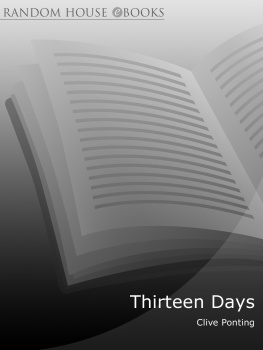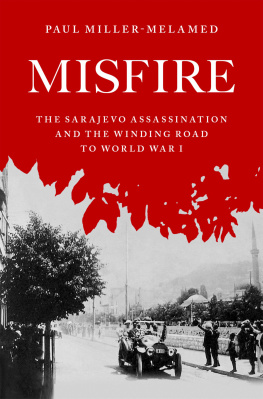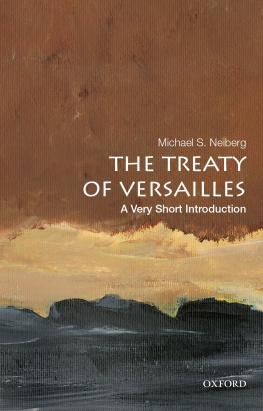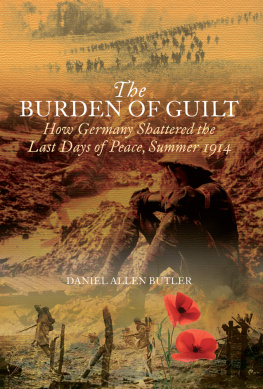Contents
About the Book
At the end of the First World War, Germany was demonised. The Treaty of Versailles contained a war guilt clause pinning the blame on the aggression of Germany and accusing her of supreme offence against international morality. Thirteen Days rejects this verdict. Clive Ponting also rejects the thesis that Europe in 1914 had reached such a boiling point that war was bound to erupt and the theory that the origins of the War lay in a mighty arms race. He argues that the War occurred primarily because of the situation in the Balkans, while he gives full weight to Austria-Hungarys desire to cripple Serbia instead of negotiating, and to Russias militaristic programme of expansion. Clive Ponting begins with a dramatic recreation of the assassination in Sarajevo on 28 June. He then examines how things spiralled out of control during the weeks that led to war. The tension builds as his story criss-crosses the capital cities of Europe and describes developments day by day, and, latterly, hour by hour. The First World War destroyed the old Europe. Nearly nine million soldiers were killed and twenty-one million wounded; over ten million civilians died. By the end of the War, three great European empires Germany, Austria-Hungary and Russia had disintegrated. Why did the War happen? In 1914, the states of Europe had been at peace for forty years, and every diplomatic dispute had been resolved peacefully. Thirteen Days describes failures of communication, fateful decisions and escalating military moves; it is an extraordinary narrative of personalities and diplomacy in the dying weeks of an era in which telephone networks were in their infancy and governments relied on telegrams in code and face-to-face meetings of ambassadors.
About the Author
Clive Ponting is a Reader in Politics at the University of Wales, Swansea. He has written numerous books including the world-wide bestseller A Green History of the World, a highly controversial revisionist biography of Winston Churchill and Armageddon: The Second World War. His most recent publications are The Pimlico History of the Twentieth Century and World History: A New Perspective, also available in Pimlico paperback. He is working on a new book about the Crimean War.
List of Maps
. Sarajevo, 28 June 1914
. Franz Ferdinand and his assassins routes to Sarajevo
. Austria-Hungary and the Balkans in 1914
I NTRODUCTION
The reasons for the outbreak of the First World War have been a matter of acute controversy ever since the war began. The debate took a virulent form when, on 28 June 1919 (five years to the day after Archduke Franz Ferdinand and his wife were assassinated at Sarajevo), the German representatives were given no choice but to sign the Treaty of Versailles drafted by the victorious allies. Germany took particular exception to article 231, the so-called Kriegsschuldfrage, or war guilt clause. It stated:
Germany accepts the responsibility of Germany and her allies for causing all the loss and damage to the Allied governments and their nationals imposed on them by aggression of Germany and her allies.
In addition:
The Allied and Associated Powers publicly arraign William II of Hohenzollern, former German emperor, for a supreme offence against international morality, and the sanctity of treaties.
Over the last eighty years scholars have looked for deep, fundamental causes in the European power structure that made the outbreak of war almost inevitable. A number of different features of Europe before 1914 have been allocated primary responsibility. Apart from internal political and social pressures at least three other factors were thought to be crucial. First, the alliance structure that ensured a limited dispute in the Balkans escalated into a war involving all the major European powers. Second, economic and imperial rivalries stemming from European expansion into Asia and the Pacific and the partition of Africa in the late nineteenth century. Third, a developing arms race between the powers in particular the building of an ocean-going navy by Germany after 1897 and the British decision that it had to maintain its naval supremacy. The problem with all these interpretations is that they tend to work backwards from the outbreak of war in order to show that it was inevitable and preordained. The common picture is of a Europe reaching boiling point as heat was applied by a number of factors resulting in an inevitable explosion in the summer of 1914. The assassination of Franz Ferdinand was seen as no more than the action that lit the fuse that set off the conflagration.
This book rejects such explanations. It does not deny that the tensions were there, but it does deny that they were inevitably going to cause a European war. Europe had been divided into two alliance structures since the mid-1890s but this had not led to war. Economic and imperial rivalries around the globe were settled by negotiation and Europe was not engaged in a major arms race. On average, defence spending was at the level found in peacetime Europe throughout the twentieth century. Europe did face a large number of diplomatic disputes in the period between 1905 and 1913 Morocco in 19056, BosniaHerzegovina in 19089, Agadir in 1911 and the vast range of problems stemming from the Balkan Wars of 191213 but the crucial point is that they were all settled through diplomacy. The key question that has to be answered is why the crisis produced by the assassinations at Sarajevo was not resolved by diplomatic means. That can only be answered by studying events in detail. A small number of diplomats, senior officials, army officers and monarchs made all the key decisions. They had to act within the framework established for European relations in the early twentieth century but it was the decisions they made, their mistakes, failures and miscalculations that produced war.
In studying the diplomatic crisis of July 1914, this book rejects the common view of primary German responsibility for the war. That is not to say that Germany can escape all blame for the outbreak of the war. Some of the decisions taken by the German government contributed directly to ensuring that war was the result of the July 1914 crisis. However, other countries cannot escape responsibility. The Russian decision to mobilise was fundamental in tipping an acute diplomatic crisis into war and France did nothing to restrain its ally from pursuing this course. British policy was faltering and unclear and the misunderstandings about its position which this generated contributed significantly to the miscalculations made in Berlin.
This book argues that the First World War only occurred because of the situation in the Balkans. It was the outcome of the two Balkan wars between 1912 and 1913, the changes they precipitated in the strategic balance in the region, together with the struggle for influence between AustriaHungary and Russia, that led to war. In this respect what began as the Third Balkan War rapidly escalated into a European conflict. The primary responsibility for war therefore lies with three states. First, Serbia, where there was an aggressive, ideologically motivated nationalism, entrenched under the extremists who brought the Karadjordjevi dynasty to the throne in the bloody 1903 coup. The extreme nationalists were never reconciled to the Austro-Hungarian annexation of Bosnia-Herzegovina in 1908 which they saw as part of historic Serbia, even though the majority of the population of the provinces were not Serbs. The assassinations at Sarajevo were directed, funded and organised by factions within the Serbian administration. They were carried out by extreme Serb nationalist terrorists. The second state which must bear primary responsibility for the war is Austria-Hungary. It viewed the expansion of Serbia in 191213 as a fundamental threat. It was not simply the Serbian desire to gain BosniaHerzegovina that made it an enemy of AustriaHungary. The mere existence of a Serb national state acted as a potential disintegrating force within the multinational Habsburg empire and tended to encourage other minority populations, not just Serbs, to look outside the empire for support in establishing their own national states. It was the determination of the government in Vienna to use the assassinations as an excuse to permanently cripple Serbia through military conquest and dismemberment, and throughout the July crisis to reject any diplomatic settlement, that was a fundamental cause of the outbreak of the war. The third state was Russia. It had been expanding westwards for more than two hundred years and saw the Balkans as an important area which should form part of its sphere of influence, even though the attempt to bring this about inevitably brought it into conflict with AustriaHungary. Russia supported Serbia simply because it was an enemy of AustriaHungary, although some elements in the Russian government also saw such actions as support for another Slav and Orthodox state. It was the Russian decision not to allow AustriaHungary to impose a diplomatic humiliation on Serbia, let alone defeat it in a local war, that ensured the outbreak of a European war.
Next page











